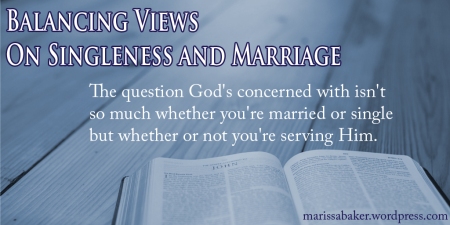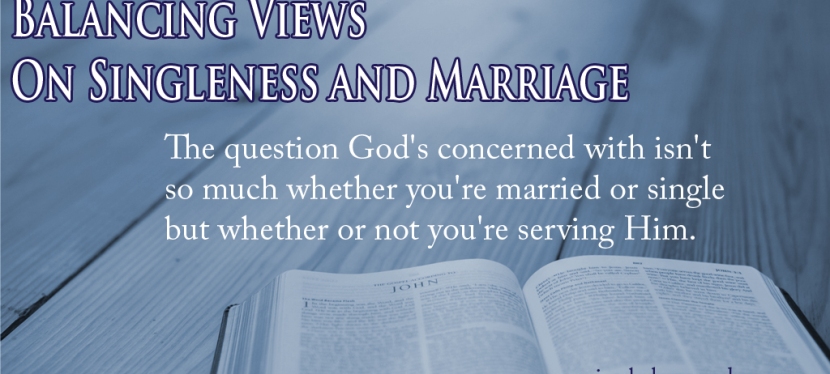Most modern Christian churches develop a culture that prioritizes marriage. We know marriage is a good thing and that it’s part of God’s plan for humanity. Marriage pictures the union between Christ and His church. Beyond the spiritual aspects, it’s also held-out to young people as a sort of “prize” for listening to what the Bible says about purity pre-marriage.
Since we think of marriage as such a good thing, we think of the opposite as something negative. Western culture is, on the whole, very binary. If something is good, the opposite is bad. Our minds don’t naturally consider that both could be good in the proper context. With this mindset, singleness is treated as less-desirable and if a single person doesn’t want to marry we think there’s “something wrong” with them. But is this really how God views things?
Seeking Balance
It’s a safe bet all my Christian readers know of the verses discussing marriage in a positive light. The marriage relationship was established at creation and in the New Testament Paul connects it to Christ and the church (Gen. 2:18-24; Eph. 5:22-32). Proverbs 18:22 maintains that “he who finds a wife finds a good thing.” Marriage is certainly seen as a good thing in the Bible. I’m not disputing that and I still hope someday to get married. But I think we make a mistake if we assume marriage’s goodness makes being single a bad thing.
In Misreading Scripture with Western Eyes, E. Randolph Richards and Brandon J. O’Brien discuss Western culture’s critical take on celibacy. Our culture sees sex as always good and the church has followed that line of thought to a certain extend by affirming “that God wants us to have a gratifying sex life, albeit in the right context: marriage” (p. 38). That’s not an incorrect statement. But “what goes without being said among Western Christians, especially in America, is that celibacy has no inherent spiritual value” (p. 37). This is a non-Biblical teaching.
Many years ago, some of the early church fathers taught that celibacy was a holier state than marriage. We’ve swung in the other direction, but that doesn’t mean we have a more balanced view. In the August 2011 issue of Christianity Today, John Stott wrote,
If marriage is good, singleness is also good. It’s an example of the balance of Scripture that, although Genesis 2:18 indicates that it is good to marry, 1 Corinthians 7:1 (in answer to a question posed by the Corinthians) says that “it is good for a man not to marry.” So both the married and the single states are “good”; neither is in itself better or worse than the other. (from article “John Stott on Singleness”)
Paul on Singleness
Let’s take a look at some Bible passages affirming singleness. In 1 Corinthians 7, Paul counsels the unmarried and windows that “it is good for them to remain single as I am.” He’s not saying marriage is wrong, and notes that God hasn’t given everyone the type of gift which would make them content in the state of celibacy. In Paul’s view, it is better to stay single, but it is also “better to marry than to burn with passion” (1 Cor. 7:7-9).
Paul is the same writer who described married as a great mystery pointing to Jesus Christ. So why does he call singleness better? One reason he gives is “the present distress” because “the time is short” (1 Cor. 7:26-29). Even without researching historical background on what he’s talking about we can identify with the sentiment. The world is becoming more ungodly all the time and we’re getting ever closer to Christ’s second coming.
But I want you to be without care. He who is unmarried cares for the things of the Lord—how he may please the Lord. But he who is married cares about the things of the world—how he may please his wife. There is a difference between a wife and a virgin. The unmarried woman cares about the things of the Lord, that she may be holy both in body and in spirit. But she who is married cares about the things of the world—how she may please her husband. (1 Cor. 7:32-34)
Paul says singleness gives you an opportunity to “serve the Lord without distraction” in a chaotic world (1 Cor. 7:35). Yet he also makes sure to note that marriage is not a sin and affirm sex within marriage as a good thing lest his readers take the celibacy argument too far (1 Cor. 7:2-5, 10-11, 36-39).
Jesus and the Eunuchs
Another passage on singleness and celibacy (for the two always go together in scripture) is found in Matthew 19. Here, Jesus is telling people that divorce wasn’t a part of God’s original plan for marriage. The disciples respond, “If such is the case of the man with his wife, it is better not to marry” (Matt. 19:1-10).
But He said to them, “All cannot accept this saying, but only those to whom it has been given: For there are eunuchs who were born thus from their mother’s womb, and there are eunuchs who were made eunuchs by men, and there are eunuchs who have made themselves eunuchs for the kingdom of heaven’s sake. He who is able to accept it, let him accept it.” (Matt. 19:11-12)
Jesus used the Greek word eunouchos to describe people able to receive the gift of singleness. This word can either mean a literally castrated person, someone “naturally incapacitated” for marriage in one way or another, or “one who voluntarily abstains from marriage” (Thayer’s dictionary, entry G2135). This passage is key to a study of marriage and singleness because Jesus is talking in a positive light about people who can’t or choose not to have sex.
A Question of Motive
Paul says singleness is good because it lets people serve God without distraction. Jesus said celibacy was given to some “for the kingdom of heaven’s sake.” The Biblical reasons to abstain from marriage have to do with serving God and drawing closer to Him. When you think about it, though, these are also Biblical reasons to get married. The marriage state models Christ’s relationship with the church and can draw you closer to God, and it also provides opportunities to serve as a married couple.
The question God’s concerned with isn’t so much whether you’re married or single but whether or not you’re serving Him. We have examples of people following God in many relationship states. Philip’s four daughters taught God’s word as never-married virgins (Acts 21:8-9). Anna the prophetess served God as a widow (Luke 2:36-38). Aquila and Priscilla worked for God as a married couple (Acts 18:36; Rom. 16:3).
Paul told the Corinthians, “whatever you do, do all to the glory of God” (1 Cor. 10:31). He’s not talking about marriage in this passage, but the principle applies. Whether we stay single or marry, we must live lives that glorify God, putting away selfishness to walk in Jesus’ footsteps. When He is our priority, we can serve Him regardless of our relationship status.

I appreciate this post. Thank you.
LikeLiked by 1 person
Very good, very balanced post Marissa … reveals a mature spiritual outlook on the subject. I know people who are miserable in marriage, as well as people who are blissfully single. Others who are happily married, and some who are painfully single. The Biblical key is to be content in whatever state we find ourselves.
LikeLiked by 1 person
Hello Marissa,
It’s good to read this post, and I want to ask you this: Do you agree with same-sex marriage? I know that this topic is not part of the article, but I would like to know your opinion about this issue.
Thank you
LikeLike
I believe that the Bible teaches homosexuality is a form of “sexual immorality.” That also includes adultery, fornication – basically any sex that’s not happening within a man-woman marriage. As a sin, it’s something Christians should not do (but someone can certainly be forgiven of if they repent).
You used the term “same-sex marriage,” though, which brings in the issue of whether or not I think it should be legal. In a culture that has rejected Bible-based morality, I don’t think the church can insist a secular government force non-believers to act according to the Bible. Because of that, I don’t oppose the legalization of it (though I’d rather not have it called “marriage”). The church lost that battle long ago, when the prevailing culture rejected God’s definitions of what constitutes sin.
I do wholeheartedly oppose any effort made by the government to force churches to say that same-sex marriage is moral. Our religious freedom should protect our rights to stand up for the truth including, for example, a pastor’s right to refuse to perform a same-sex marriage ceremony. Just because something is legal doesn’t make it right (a situation the church has faced for as long as man-woman sex outside of marriage has been legal. Or lying, or disrespecting your parents. There are lots of things you can “get away with” under civil laws that violate God’s commands).
LikeLike
What about 1 Peter 4:8?: Above all, love each other deeply, because love covers over a multitude of sins.
If a man loves another man, and if homosexuality is a sin, Shouldn’t that love forgive all sins (including homosexuality)?
LikeLike
The love Peter is talking about in that verse is agape (selfless, benevolent, godly love), not eros (romantic, sexual love). All people should have that kind of love toward each other because it’s the kind of love God has for us. This is the same Greek word used when Jesus tells us to love our enemies, as well as our neighbors. It doesn’t even necessarily involve the feelings we associate with the notion of “love” in English.
Agape love does forgive sins (“covering” them instead of rubbing someone’s face in them), but forgiveness isn’t the same as condoning a sinful practice. Paul talked about this in 1 Corinthians chapter 5 where he addressed the problem of someone in the church openly committing sexual immorality. While he told the church members it wasn’t their place to judge those outside the church, he said in no uncertain terms that someone who claims to follow Jesus while openly practicing sin should not be allowed to fellowship with other believers. This person was a defiling presence in the congregation and could not be welcomed back until after he’d repented and stopped committing the sin.
This was for the sinful man’s good as well as the church as a whole. Agape love always seeks the other person’s good, and it’s not good to tell people who are persistently practicing sin that they’re okay with God. Rather, we should urge them toward repentance in a spirit of kindness and love. We know from Paul’s second letter that it worked in this case. The man did stop sinning, repented, and after that he was welcomed back with a spirit of forgiveness that “covered” his past sins by looking beyond them to love and respect him as a fellow believer (2 Cor. 2:3-11; 7:8-12).
Misdirected eros doesn’t cancel out sexual sin, no matter who’s involved. Only God can remove sin, and He does that in response to our sincere repentance (which involves recognizing that we’ve transgressed His commands and turning away from our sins) and our request for forgiveness in Jesus’ name. Once our sins have been “covered” and washed away in Jesus’ blood, the proper response is for us to do what Christ told the adulterous woman: “Go, and sin no more” (John 8:11).
LikeLike
Thank you Marissa for your honest opinion. I really appreciate and respect it.
LikeLiked by 1 person
Thank you, Liam
LikeLike
“This passage is key to a study of marriage and singleness because Jesus is talking in a positive light about people who can’t or choose not to get married.” I’d probably change that to “people who can’t or choose not to have sex.” It may be easy to choose not to go the courthouse and get a marriage license (i.e., Samaritan woman at the well). However, it’s not so easy to choose not to have sex.
LikeLiked by 1 person
Good point. Think I will edit that line. Thanks 🙂
LikeLiked by 1 person